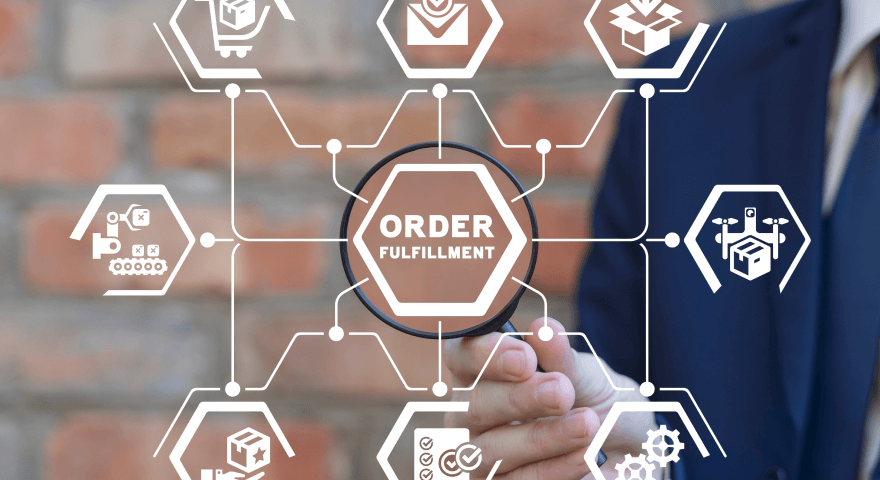Imagine this - you're the supply chain manager for a global company. You're responsible for ensuring that everything runs like clockwork, from sourcing raw materials to shipping finished products. It's a demanding job that requires precision, attention to detail, and a whole lot of organization.
But what if you could streamline some of those tasks with the help of artificial intelligence (AI)? That's exactly what's happening in the world of supply chain management today. From inventory management to shipping logistics, AI is changing the game.
For example, let's say you're dealing with a complex supply chain involving multiple suppliers, each with their own lead times and delivery schedules. Normally, managing all those variables would require a lot of manual effort and some serious mental gymnastics. But with AI-powered analytics tools, you can make sense of all that data in seconds, identifying bottlenecks and optimizing your supply chain for maximum efficiency. No wonder, most businesses across the globe are rushing to implement suitable AI technologies for their business operations. A report published by MarkWide Research indicates that the AI in supply chain market is expected to grow from USD 2.21 Billion in 2018 to USD 13.48 Billion by 2025, at a CAGR of 34.2%.
Benefits of AI in Supply Chain Management
Businesses with supply chain dependencies are rapidly exploring AI systems to streamline their operations and boost process efficiency. Here are the various ways in which AI benefits supply chains:
1. Lesser human errors with automation
One of the biggest benefits of AI in supply chain management is the ability to automate repetitive and mundane tasks. This can reduce the risk of human errors, which can have a significant impact on the efficiency and profitability of a business. For instance, when monitoring inventory levels, AI-powered systems can recognize when items need to be restocked or reordered, minimizing the risk of stockouts or overstocking. Similarly, automation can help ensure that orders are accurately picked, packed, and shipped, reducing errors that can result in returns or dissatisfied customers. Automation can also help to reduce labour costs, allowing employees to focus on more strategic tasks.
2. Better decision-making with advanced analytics
With AI-powered analytics, supply chain managers can gain deeper insights into their operations, such as real-time inventory levels, supplier performance, and demand forecasting. This information can help them make more informed decisions, such as when to reorder inventory, which suppliers to use, and how to optimize logistics routes. For instance, by using predictive analytics, supply chain managers can optimize inventory levels to prevent overstocking or understocking, which can result in lost sales or excess costs. They can also analyze data to identify patterns in customer demand and adjust their operations accordingly to meet those demands. Overall, advanced analytics can significantly improve decision-making in supply chain management, leading to increased efficiency, cost savings, and customer satisfaction.
3. Faster speed of operations & higher employee productivity
An article published by McKinsey in 2021 states that AI-enabled supply chain management, if implemented successfully, can improve logistics by 15%, inventory levels by 35% and service levels by 65% in comparison with slow-moving competitors. AI can help to speed up supply chain operations and increase employee productivity by providing real-time insights and optimizing workflows. For example, machine learning algorithms can analyze and optimize delivery routes to reduce transportation time and costs. This can help businesses meet delivery deadlines and improve customer satisfaction. Additionally, AI-powered chatbots can handle customer inquiries and support tickets, freeing up employees to focus on more complex tasks.
4. Improved scalability
AI can help supply chain businesses to scale in several ways. For instance, AI can enable businesses to identify and eliminate inefficiencies in their supply chain processes, allowing them to streamline their operations and reduce costs. This can involve using AI to optimize transportation routes, manage inventory levels more effectively, or identify the most efficient ways to allocate resources. Additionally, AI can help businesses to forecast demand more accurately, which can be crucial when planning for growth. With more accurate demand forecasts, businesses can ensure that they have enough inventory to meet customer needs while minimizing the risk of overstocking. Finally, AI can also help businesses to automate certain tasks, such as order fulfilment or invoicing, freeing up employees to focus on higher-level tasks that are more strategic in nature.
5. Establish circular economy loops
In the past, economic outputs were the sole indicator of supply chain performance, but today, sustainability is just as important, especially for achieving the Sustainable Development Goals set by the United Nations. Artificial intelligence (AI) can significantly enhance supply chain sustainability by predicting equipment failure through predictive maintenance, extending equipment lifespan and minimizing waste. AI algorithms can identify bottlenecks and inefficiencies to maximize resource efficiency and reduce waste in production and supply chain operations. AI can optimize product design for circularity, identify opportunities for reuse and recycling, and reduce waste further.
Additionally, AI can optimize inventory levels, predict demand, minimize overproduction, identify effective processes and materials for recycling and reprocessing, and enable effective management of resource flows by providing greater supply chain transparency.
Overall, the benefits of AI for supply chain management are numerous, and businesses that embrace these technologies are likely to gain a competitive advantage in the marketplace. So, what makes people skeptical toward AI adoption?
Barriers to AI Implementation in Supply Chain Management
Are the benefits of AI too good to be true? AI is certainly transforming supply chain management, but it's not without its challenges.
Here are the key challenges in implementing AI for your supply chain:
1. Biased output
AI bias can stem from various sources such as biased or incomplete training data, the design and implementation of the AI algorithm, complex algorithms like neural networks, and model refinement. A biased AI system designed to optimize supply chain efficiency may prioritize certain suppliers or locations, leading to underutilization of resources in other areas, and a biased system that only considers sales data from specific regions may not predict demand accurately, leading to waste in some areas and missed opportunities in others.
Complex algorithms can introduce biases that are hard to detect, while model refinement can introduce bias if the new data used is not representative of the real-world population. To mitigate AI bias in the supply chain industry, it is essential to carefully design and test the algorithm, implement transparency and explainability measures, and regularly monitor and audit the system to identify and address any biases.
2. Lack of transparency
Transparency is related to the ability to interpret data and models, the data provenance, the structuring of pipelines and databases, among other factors. The use of deep learning models is subject to the black box problem, which affects interpretability of a system, creating a transparency issue. This makes it difficult to understand how the AI system is making its decisions, and whether it is making those decisions in a fair and unbiased manner.
3. Threats to data privacy
The use of sensitive data or models acting in the field of surveillance can generate privacy issues. On the European level, such topics are regulated by the General Data Protection Regulation (GDPR). However, the GDPR does not cover the risks posed by AI systems. With AI implementation, companies need to be careful about collecting, storing, and using sensitive data to avoid potential privacy violations.
4. Non-environment-friendly
According to the 2019 MIT Technology Review Report, training a single AI model can emit over 626,000 pounds of carbon dioxide, which is equivalent to the lifetime carbon emissions of 5 cars. To ensure sustainable and eco-friendly use of AI, companies need to take responsibility and reduce the environmental impact of AI systems by using renewable energy sources. The Science Based Targets initiative assists companies in setting greenhouse gas emission reduction targets that align with the goals of the Paris Agreement. Companies need to be aware of their carbon emissions and adopt such initiatives to ensure that their AI infrastructure is sustainable.
What Is AI Ethics and Why Is It Important?
As beneficial as it is to implement AI in your business operations, it is necessary to ensure that you use this powerful tool ethically. AI ethics refers to a set of principles and values that guide the development and deployment of artificial intelligence systems. It's all about making sure that AI is used in a responsible and ethical manner that does not harm society in any way.
To ensure ethical use of AI in the supply chain industry, companies must take steps to identify and mitigate potential biases in their AI systems, such as conducting regular audits, using diverse and representative data sets, and implementing transparent and explainable AI models. This will help to ensure that AI is used to improve supply chain efficiency and reduce waste, while also minimizing the potential for unintended consequences and harmful impacts.
Conclusion
AI has the potential to transform the supply chain industry, but it must be used responsibly to avoid the risks associated with it. Businesses must prioritize ethical standards and establish policies and guidelines for the ethical use of AI to gain the trust of customers, partners and society.
The upcoming EU AI Act will impose strict regulations on data quality, transparency, human oversight and accountability, in addition to addressing ethical and implementation challenges across various sectors. As a responsible AI-focused company, aioneers acknowledges the significance of ethical AI practices and is already preparing to comply with the new regulations. We are developing our own guidelines and rules to maintain ethical standards in all our operations.
If you’re interested in discovering how you can leverage ethical AI to enhance your supply chain operations, check out our whitepaper.





%20In%20Supply%20Chain%20Management.jpg)


.png)
